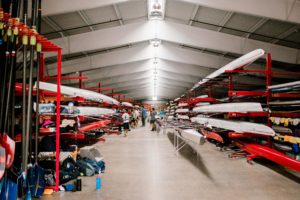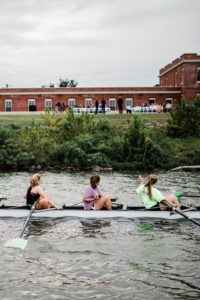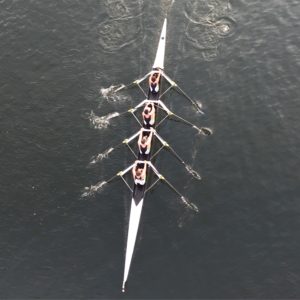
Photos courtesy of White Rock Rowing
By Sujata Dand
East Dallas resident Tamber Johnson loves her mornings rowing on White Rock Lake.
“I love starting my day with the perspective of being on the lake and looking back at the city,” Johnson says. “I really miss it.”
Last month, Johnson and more than a dozen other rowers were denied membership to White Rock Rowing (WRR), an arm of White Rock Boathouse, Inc. The non-profit organization was created to give Dallas area students affordable access to the sport of rowing. WRR manages and maintains the Filter Building, The Sam Leake Boathouse and the Boomerang on White Rock Lake. Johnson has been a member for 10 years. This was the first time she had to fill out an application for the club.
“In almost every instance, those of us advocating for transparency and best practices were not accepted back into the club for 2019,” Johnson explains. “I can only conclude that the board is operating the White Rock Boathouse as a private club on our public lake.”
This is Chip Northrup’s worst fear. He is one of the founding members of White Rock Boathouse, Inc.
“When I retired from the board, the people that were left turned it into a closed club,” he says. “Just this year they instituted an application process, which is unheard of. They are using this application process to exclude people.”
An avid rower for more than 50 years, Northrup grew up in Highland Park. After rowing at Brown University, Southern Methodist University (SMU) and Wharton Graduate School in Philadelphia, he returned to Dallas and founded rowing crews at Jesuit College Prep and Ursuline Academy.
“The notion that we could mint scholarships for women to go Title IX in rowing, that was unheard of [in Dallas], but that’s basically what we were doing. We figured that out at the Dallas Rowing Club at Bachman Lake with Ursuline,” Northrup recalls. “The first boat I coached — they all went on scholarship. One of them went to Harvard, the Naval Academy, Plan II at Texas and my daughter at SMU. The idea was to do this for more people, frankly the kids who really needed it — the kids in public schools.”
Northrup says the Dallas Rowing Club was not interested in creating an all-city public-school rowing program. So, Northrup moved to White Rock Lake. In 2004, he established White Rock Boathouse, Inc. (WRBH) with Keith Young, Jr., David Payne, John Mullen and Sam Leake.
WRBH, Inc. entered into a public-private partnership with the City of Dallas. For 15 years, WRBH has run the Filter Building, the boathouse next door and the boathouse at T&P Hill. In exchange for the lease, Northrup says he and the Mullen brothers put up most of the $2.7 million dollars to pay for the new boathouse, which officially opened in 2008.

The rental income from the Filter building and the revenue from the boat house rentals would subsidize costs for student rowers and pay for maintenance of the buildings and the programs. Ten percent of the overall revenue was supposed to be set aside by the city for lake beautification.
“I made mistakes,” Northrup admits. “I decided that the founders should maintain control of the board because we had a specific egalitarian purpose and we wanted to make sure that was perpetuated. I never thought that it would turn into a nautical sorority.”
Northrup left the board in 2007 because he was spending less time in Dallas. Sam Leake was the only founding member left on the board. Northrup says Leake appointed novice rowers or people with no experience to the board. Months later, Northrup noticed something that made him scratch his head.
“All of a sudden the name Sam Leake appeared on the exterior of the boathouse,” Northrup remembers. “That wasn’t in the lease. And, you can’t just slap your name on a city facility without being approved by the city. I talked to Sam about that. Where did this come from? I began to realize that there was something fishy going on with the board. It was becoming a little self-indulgent.”
10 Years Later: Kian’s Story
“Changing lives by putting oars and opportunities in the hands of Dallas area youth.”
That’s the mission statement of White Rock Rowing. It’s featured prominently on their website. And, it’s why Kimber Yank went to the White Rock Boathouse. She remembers visiting for the first time three years ago.
“It was amazing. A beautiful boathouse. Everyone was together. I saw videos of rowing. I said this is what my son should do.”
Yank’s son Kian was entering Woodrow Wilson High School as a freshman. She says he was small for his age, and other sports hadn’t worked out. She signed him up for rowing summer camp and he loved it.
“It is his livelihood. It is his being — his whole soul. I believe that it changed our lives because it gave him a purpose in life, which it still does. I think there are college opportunities, but more than that, it grounded him and made him the person that he is today. Disciplined.”
Kian says he walks out the door at 4:30 in the morning to row on the lake, and gets back home at around 7:30 a.m. to get ready for school. He often works out after school and rows on most weekends.

Photo courtesy of Kimber Yank
Yank says what made it amazing was the coaches, particularly the boys’ varsity coach. Sebastian Peters was an Olympic-level rower who had attended the University of Washington. He took a special interest in his team, made up of Woodrow, Bishop Lynch and Bryan Adams students.
“He taught those boys so much. He taught them about rowing. Nutrition. Respect. He guided them,” Yank says. “White Rock was kind of a losing team and he brought them up. We started winning and winning and winning. Those boys looked at Coach Peters like he was the most amazing person in the world.”
“It was a great experience until that one day,” Kian remembers. “It was halfway through our [workout] session and we see our coach being talked to by one of the board members. [The coach] walked over to us and told us he was fired and everything was going to be okay. It wasn’t.”
Yank says the boys flipped out, some of them threw their uniforms in the trash. While board members dispute whether Coach Peters resigned or was fired that day, the damage was done. Within weeks, Yank says half of the boys went across the lake to Dallas United Crew; the others quit.
“The thing that bothered me was that the program cratered,” Northrup says. “They were down to one boy. This is probably the biggest rowing facility in the world and they have one varsity boy. That took some doing.”
Yank says when Coach Peters left, she and other parents began asking questions about the finances of White Rock Rowing.
“The allegations and the lies and the deceit. I’m not willing to be a part of that. I think the coach got fired because he opened the can of worms. He started asking for a boat, supplies and equipment and he was told there was no money,” Yank recalls. “And, then he started doing research. How can there be no money? Why are you not putting money back into the sport and the kids?”
Yank moved Kian to Dallas United Crew. Her fees doubled. Instead of paying $1290 a semester, she was paying $2577 a semester.
Kian says he is doing well. He just returned from a trip to San Diego where his rowing team placed third in the national competition. He plans to row in college, but doesn’t expect to ever have a coach like Sebastian Peters again.
“I miss my old coach,” Kian says. “He cared for us so much.”
The Whistleblowers: Friends of White Rock Rowing
Coach Sebastian Peters left White Rock Rowing in January 2018. A few months later, he returned to his native Germany. Meanwhile, the coaching staff continued to disintegrate. By the end of the season, WRR had lost five coaches.
A group of concerned parents and adult rowers affiliated with WRR banded together to create a new group called Friends of White Rock Rowing. They presented a petition with more than 70 signatures requesting new bylaws, a new board and greater parental input to the board.
The board had not changed much in 10 years. Sam Leake was the treasurer. After seeing the petition, he and four other board members resigned.
In an interview from March of 2018, the president of White Rock Rowing, Sue Ellen Chambers, said the non-profit had hired a consultant to help restructure the organization. She said: “I do think from our members’ point of view, everyone has a different perspective and everyone has a different idea of how it should be run. I think that some of it is just having the patience to let us do the work that needs to be done. I feel like that’s where some of the uprising comes from. That they want it done overnight.”
Courtney Williams was new to White Rock Rowing in the summer of 2017. The 28-year-old digital product manager had rowed at the University of Texas at Austin, and was eager to get involved at White Rock Rowing.
“There was a core group of us that was working out together,” Williams says. “We had a plan to compete and we were the ones asking questions.”
When the board said they would create a transition committee to improve communication between rowers and the board, Williams says she was the ideal representative because she had a good relationship with Chambers and board members.
“We had two meetings,” Williams remembers. “I wasn’t comfortable with their new Code of Conduct.”
Williams had researched other boathouses across the country and examined different Codes of Conduct. Typically, the Code of Conduct was used to reflect the values of the boathouse, but at WRR, Williams says, the Code of Conduct was a punitive set of rules.
“They were talking about kicking people out if they said something they didn’t like or if they had the audacity to row with another program. It was very insular.”
Williams says she occasionally rowed with a former WRR coach at Dallas United Crew, but that didn’t impact her relationship with WRR.
“In the final meeting last April, the board attacked me verbally about my loyalty to them,” Williams said. “I’m in tears because they are coming at me. After that, they never invited me to another meeting again.”
Williams says she was never given access to the consultant.
“Even though that was a promise that the Masters rep would have access to the consultant. I never saw any documentation that may have come out of their engagement with her. My relationship with the board ended.”
By the end of the summer, Friends of White Rock Rowing say there was still no transparency and the board seemed even more hostile.
Chip Northrup and others met with Dallas City Councilmember Mark Clayton to talk about the lease and how White Rock Rowing was being run. Clayton requested an audit. However, before the audit was completed the city renewed the T&P boathouse lease for another five years.
“The city renewed the T&P boathouse lease before they did the audit. And, after the audit they found that White Rock Boathouse was out of compliance,” Northrup complains. “They should never have renewed that lease — don’t renew that lease without including these commitments.”
By commitments, Northrup says he wanted to see formal measures in place to track whether the non-profit is fulfilling its mission of putting oars in the hands of Dallas area youth, particularly public school children.
The audit stated there are no “formal policies and procedures in place for oversight and monitoring” of contracts between White Rock Boathouse and the city.
“If you don’t make these conditions, then sooner or later they will drift away from their mission and they won’t do it,” Northrup warns.
Courtney Williams says members haven’t heard anything from the board since the audit came out.
“There’s no response,” Williams says. “I can’t understand how you can have a resource like that and nothing happens with it. Its almost a million dollars a year that they are getting from the Filter building in revenue. Their kids’ program is next to nothing. Their varsity program doesn’t exist anymore. It’s mostly middle schoolers built off of a reputation of a coach who is now at Dallas United. It didn’t have to be that way. It’s a complete waste of a resource.”
Candidates running for Mark Clayton’s District 9 seat are listening. Erin Moore was at a gathering organized by Chip Northrup.
“White Rock Rowing had traditionally operated on a loosely constructed contract and handshake agreements,” Moore says. “It is clear that more structure, oversight and professionalism is needed going forward.”
“I do think there should be more oversight,” Paula Blackmon agrees. She wants an independent operator at White Rock Boathouse to manage the daily operations so that the board can focus on creating a master plan and developing clear metrics for student participation in rowing programs.
“If these items cannot be met by Oct. 1, 2019, we shall seek legal advice from the city attorney’s office to begin terminating the contract.”
Candidate Sarah Lamb says she was surprised that the audit revealed that some Boathouse financial records were missing before 2016.
“We have to as a city make sure there are no abuses of our contracts,” Lamb says. “I’m not implying that the Boathouse was intentionally reckless, but they need to have a better control over their funds especially because they are stewards of Dallas’ money.”
Officials from White Rock Boathouse did not respond to interview requests. They did issue a press release with a statement from White Rock Boathouse President Sue Ellen Chambers.
“Recent commentary distorts the true story of White Rock Rowing and its tremendous benefit to the city and community,” says Chambers. “The accounting practices have been strengthened between the city and organization and greatly developed throughout the last year and there is complete financial transparency.”
In the last year, White Rock Rowing has hired an executive director to put space between the coaches and the board. Insiders say the middle school rowing program is growing with the addition of students from the Episcopal School of Dallas and Bishop Lynch.
Tamber Johnson is unsure of her next steps. She and others who have been disenfranchised from the WRBH have yet to receive a clear answer from the board as to why their memberships were denied. In an email from Sue Ellen Chambers, Johnson was told “membership in WRB is subject to the discretion of, and approval by, WRB board of directors. The Board determined that WRB’s interests are best promoted by denying your application at this time.”
“I no longer feel that this is a question for the Board of White Rock Rowing. This is now a question for both the City of Dallas and more critically for my fellow Dallas citizens,” Johnson said. “Is it okay for a tenant of the City of Dallas to exclude citizens without cause?”
Meanwhile, Johnson’s single shell boat sits in the White Rock Boathouse. She was supposed to move it out by April 1. With no place to store it, she has decided to donate it to Jesuit’s rowing program in the spirit of keeping oars in the hands of Dallas kids.
District 9 candidates Tamara Brown Rodriguez and Jacinto Valdespino did not respond to an interview request for this story.
